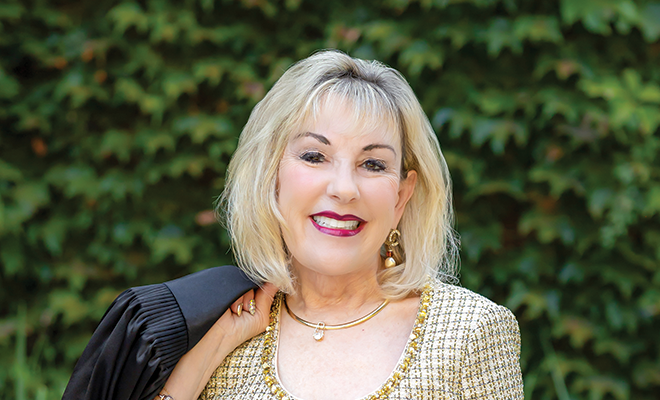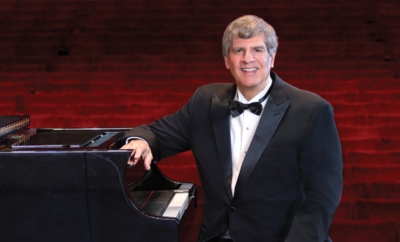 Ann Ishii Photography
Ann Ishii Photography
Judge Consuelo Callahan: Prepared & Professional
Judge Consuelo “Connie” Callahan, who currently sits on the second highest court in the nation—the U.S. Court of Appeals for the Ninth Circuit—is an impressive trailblazer whose remarkable career started in Stockton, California. Her resume includes landing her first job out of law school with the Stockton City Attorney’s Office, a tenure with the San Joaquin District Attorney’s Office, becoming the first woman and first Latina to serve on the San Joaquin County Superior Court and the first judge from San Joaquin County to be appointed to the federal bench.
A California native who earned her juris doctor degree at University of the Pacific’s McGeorge School of Law in a class with fewer than ten women, Connie said certain actions and values paved the way for her success and have paid off ever since: hard work, making connections while serving the community, and in general, “doing more than just my job.” It’s a message she has shared through numerous speaking engagements and with the countless individuals she has mentored.
Influential Ability
The petite blonde leaves an indelible impression on anyone she meets, commanding the room with a fabulous outfit, an unforgettable wit and an iconic intellect. Her influence is felt and her advice is sought. “She wants you to be a better person personally, professional and spiritually. She helps you work on yourself in all aspects,” Associate Justice Shama Mesiwala of California’s Third Court of Appeals said.
Connie has been mentoring Shama for 25 years and doesn’t hold back when it comes to advice. As a mentor, Connie is always ready to share some hard truths, telling those around her what they need to hear. Nothing is off topic. “I’ll never forget her telling me, ‘You’ve got to ditch the support pantyhose and your granny shoes. You’re 25 years old, there is no reason to be wearing that,” Shama said.
On a recent summer day, she’s sporting blinged-out eyeglasses, a bedazzled manicure, sparkling jewelry and a sumptuous white suit. “I think she showed women, particularly women of color, that you can be taken seriously and also be your authentic self and that’s a profound lesson,” Shama said.
Along with her special je ne sais quoi, there is the irrefutable evidence that she is built on impeccable integrity, a giant intellect and a drive that is unmatched. But she also credits those around her who gave her support when she needed it. “I was the first woman in 74 years to go to the California Courts of Appeal. The Ninth Circuit is the second highest court in the land. So, for that to happen, it’s like an eclipse where things do or don’t line up, but for the people who work hard, respond to opportunities and have the support of the right individuals, as I had, these things are made possible,” she said. “I’m not naive enough to think it was all my own doing. We don’t always know exactly what our purpose or plan is, but successful people look hard at what’s working, what’s not working and why, and they don’t give up. I have a spiritual belief in a higher power and I find it very moving when we have purpose. I believe we are all here for a reason.”
Providing Access
Prioritizing hard work and education, Connie’s parents set an indelible example, particularly when her father went back to school, earning a master’s and doctoral degrees in the field of education. She noted, “Things were different when I was growing up. We weren’t wealthy. We had to work for everything.” That lesson stuck. Connie’s dedication got her into Stanford, where she spent her undergraduate years before earning her law degree at McGeorge. And, like her dad, Connie also went back to school yet again. In 2004, she earned a master of laws, or LL.M., from the University of Virginia School of Law.
Equality for women is well established in the legal profession as well as the judiciary, she said, and women have had a powerful presence for much longer than people might realize. “In bigger cities like Los Angeles and San Francisco, even back when I first began my career, there were many women in the field of law and many held important positions in the judiciary,” Connie noted. “Los Angeles alone has 500 judges out of the 1,500 in California.” Equality is important, but Connie finds she is more interested in a person’s professional capabilities than their gender. “Our challenge now is to provide access to those who can do the job. Recognizing that a diverse bench is important, diversity is a broad term that can be very inclusive,” she noted. “I believe strongly in people with different viewpoints still being able to uphold the law. The public can get caught up in what they think the law should be rather than what it is—and what it is is what binds the judge. Judges try to do the job in an honest way.”
Connie has served on UOP’s Board of Regents for decades, and in May 2025 University of the Pacific presented her with an honorary doctorate of laws degree before she delivered the commencement address. “Connie is phenomenal—brilliant, thoughtful and fearless,” said Board of Regents Chair Mary-Elizabeth Eberhardt, ’76, in announcing that Connie would be honored. “People pursue legal careers because they want to improve life for others. For 50 years, Connie has helped others not just in the courtroom, but at every opportunity she can find to mentor and uplift someone else. Her mentees gain the confidence to push boundaries in their own careers because people like Connie paved the way.” Speaking at commencement, Connie emphasized the importance of gratitude for the top-quality education they’d received and urged them to seek their own purpose in life as part of the UOP legacy. “Someday, one of you will be up here giving the commencement address” she said. “Mark my words.”
Career Beginnings
The stress and pressure to find a job upon graduating is an experience Connie recalls vividly. “I did well academically, but I did not have a job lined up after graduating,” she shared. “For this reason, I took the first job offered and that happened to be with the Stockton City Attorney’s Office.” She quickly transitioned to the San Joaquin County District Attorney’s Office. While working there she served as president of the Child Abuse Prevention Council and was actively involved in recognizing and meeting the needs of the community through a variety of volunteer positions. Looking back on her remarkable career, Connie is proud, even a little surprised, that she never experienced a single day of being unemployed. “Every time I finished a job, say on a Friday, I always began a new job the next business day,” she explained. It’s a story of encouragement that she shares when speaking with students.
“It was never hard for me,” she said of her career path and success. “I’m service oriented. You serve, you do more than your job, and it leads you down a path to success and more opportunities. I don’t believe in coincidences. I think I landed in Stockton for a reason,” she emphasized. That said, Connie is adamant in expressing her deep appreciation for the people along that path who gave her those opportunities.
One of the most well-known individuals on that list of people is the late Alex Spanos. “He was right here in Stockton, and at that time, the biggest Republican donor. He was a very hard worker, with an immigrant background, and he loved Stockton. I came to know him, he was familiar with my work, and he supported my goal of becoming a judge,” she said. “I don’t know if I’d ever have made it to being a judge without being here in Stockton.”
Innovation for Survivors
During her time with the DA’s office, Connie tried 70 jury trials to verdict and lost only three. She says those three cases are the ones that stand out to her because “as an ambitious person, I don’t like to lose!” she explained with laughter. “But I truly have perspective about what’s important in life.” While working for the DA’s office, Connie recognized an overwhelming need in the community and created the San Joaquin County District Attorney’s first investigative unit for child abuse and sexual assault. “The toughest thing about that is the need for children to testify, because it’s a terrible thing for them,” she confided. “We had to find a way to do that without causing more harm. Today’s system is more helpful and supportive to those children, making them more comfortable despite having to talk about very difficult things. The point is to get to the truth.”
Driven by genuine empathy, Connie never forgets that she and the legal system are dealing with human beings. “The youngest witness I qualified to testify was a four-year-old. It made me a better lawyer. We must continue with the best lawyers where people have impediments to coming to court. There are so many challenges but we must advise and support them, provide translation services, and see to their needs while presenting the truth and seeing that justice is served.”
In 2003, Connie took one of the biggest steps in her career, moving from the California Courts of Appeal to the U.S. Court of Appeals for the Ninth Circuit after being nominated by President George W. Bush and unanimously confirmed by the U.S. Senate. Going from state to federal meant covering nine states, including Alaska and the Mariana Islands. Serving on the Ninth Circuit Court of Appeals involves a fair amount of travel for its 29 active judges, as most legal issues are handled in person. One week at a time, Judge Callahan hears about 40 cases along with two other judges as part of a three-judge panel. After that panel decides a case, an 11-judge panel might re-hear it, something referred to as “en banc.” They hear death penalty cases, but those are a rarity.
In 2005, Connie Callahan was one of two finalists for the nomination to fill Judge Sandra Day O’Connor’s seat on the U.S. Supreme Court. While being a finalist is a Wikipedia-worthy historic event, Connie reflected, “I was extraordinarily honored to be considered, and of course I would have done the job, but it wasn’t something I petitioned for. In fact, I was a little surprised to be considered, but I don’t think it was meant to be. After Harriet Miers withdrew and Justice Alito was put in place, it seemed like the right outcome to me.”
Strong Mentorship
Connie Callahan is the President of the American Inns of Court, a group that brings together attorneys at all experience levels, law professors, judges and law students. The senior members mentor the junior members with a focus on ethical programs, practical knowledge and professional skills. A top priority of the Inns of Court is its focus on increasing and maintaining civility among members of the bar.
Judge Callahan’s interest in human behavior extends well beyond the courtroom. She has studied, in-depth, what factors make people successful and regularly shares that information with others in ways they can use. She helps them fill out applications, coaches them prior to interviews, including the four law clerks she has at any one time, and meets with numerous others who can benefit from her guidance. “I am most proud of the people I’ve mentored,” she said. “I’ve always been willing to help others who are pursuing whatever it is they are doing for their education and career. My goal is to give other people—and not limited to the legal profession—support, guidance and encouragement to actualize their potential.”
A unique combination of intellect, substance and persona, Connie lifts people up with kindness and generosity, steering her mentees in directions that will help them reach their goals. But she can also be a whole lot of fun. “I have a real sense of adventure,” she laughed. A holiday luncheon she attended in Stockton this past year gave her a chance to make a grand entrance in a bespoke holiday outfit that screamed “O Christmas Tree.” It was classic Connie. “I’m anything but beige,” she admitted.










